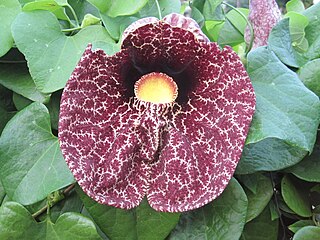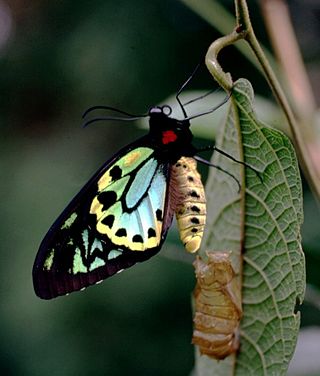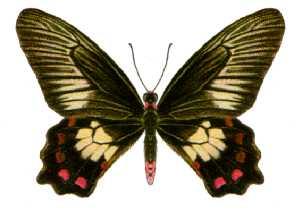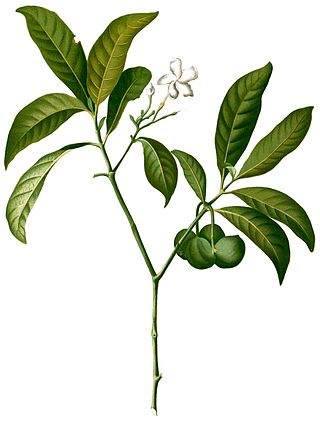
Carissa is a genus of shrubs or small trees native to tropical and subtropical regions of Africa, Australia and Asia. Until recently about 100 species were listed, but most of them have been relegated to the status of synonyms or assigned to other genera, such as Acokanthera.

Tabernaemontana is a genus of flowering plants in the family Apocynaceae. It has a pan-tropical distribution, found in Asia, Africa, Australia, North America, South America, and a wide assortment of oceanic islands. These plants are evergreen shrubs and small trees growing to 1–15 m tall. The leaves are opposite, 3–25 cm long, with milky sap; hence it is one of the diverse plant genera commonly called "milkwood". The flowers are fragrant, white, 1–5 cm in diameter.

Acanthus is a genus of about 30 species of flowering plants in the family Acanthaceae, native to tropical and warm temperate regions, with the highest species diversity in the Mediterranean Basin and Asia. This flowering plant is nectar producing and is susceptible to predation by butterflies, such as Anartia fatima, and other nectar feeding organisms. Common names include Acanthus and Bear's breeches. The generic name derives from the Greek term ἄκανθος (akanthos) for Acanthus mollis, a plant that was commonly imitated in Corinthian capitals.

The Congolian rainforests are a broad belt of lowland tropical moist broadleaf forests which extend across the basin of the Congo River and its tributaries in Central Africa. They are the only major rainforests which absorb more carbon than they emit.

Aristolochia littoralis, the calico flower or مورپنکھ بیل or elegant Dutchman's pipe, is a species of evergreen vine belonging to the family Aristolochiaceae.

Ornithoptera richmondia, the Richmond birdwing, is a species of birdwing butterfly that is endemic to Australia. It is the second smallest of the birdwing species, the smallest being Ornithoptera meridionalis.

Synsepalum is a genus of trees and shrubs in the chicle family, Sapotaceae described as a genus in 1852.

Carissa macrocarpa is a shrub native to tropical and southern Africa. It is commonly known as the Natal plum and, in South Africa, the large num-num. In Zulu, as well as in the Bantu tribes of Uganda, it is called Amathungulu or umThungulu oBomvu. In Afrikaans the fruit is called noem-noem.

Marantochloa is a genus of plant in family Marantaceae described as a genus in 1860. It is native to tropical Africa and to islands in the Indian Ocean.

Mimusops is a genus of plants in the family Sapotaceae described as a genus by Linnaeus in 1753.
Aristolochia ceropegioides, synonym Pararistolochia ceropegioides, is a plant species of family Aristolochiaceae. It is found in Cameroon and Gabon. Its natural habitats are subtropical or tropical dry forests and subtropical or tropical moist lowland forests. It is threatened by habitat loss.

Pararistolochia is a genus of plant family Aristolochiaceae.

Aristolochia goldieana is a species of plant in the family Aristolochiaceae. It is found in Benin, Cameroon, Ghana, Guinea, Guinea-Bissau, the Gulf of Guinea Islands, Ivory Coast, Liberia, Nigeria, and Sierra Leone. Its natural habitat is subtropical or tropical moist lowland forests. It is threatened by habitat loss.
Aristolochia preussii, synonym Pararistolochia preussii, is a species of plant in the family Aristolochiaceae. It is native to Cameroon, Equatorial Guinea, Gabon, and Ivory Coast. Its natural habitat is subtropical or tropical dry forests. It was assessed as "critically endangered" and threatened by habitat loss in the 2000 IUCN Red List, where it is said to be native only to Cameroon. As of February 2023, Plants of the World Online gives it a wider distribution.
Eremospatha is a genus of climbing flowering plants in the palm family found in tropical Africa. These rattans are uncommon in cultivation and poorly understood by taxonomists;. Closely related to Laccosperma, they differentiated by the near complete absence of bracts and bracteoles. The name is from Greek meaning "without a spathe".

Pararistolochia praevenosa is an Australian vine in the birthwort family. The Richmond birdwing butterfly vine grows in subtropical rainforest in coastal areas north from Wollongbar, in far north eastern New South Wales and adjacent areas in south eastern Queensland. It has been recorded as far north as the Mary River. It also grows in tropical north eastern Queensland, where it is a food plant for the Cairns birdwing butterfly.

Pachliopta polydorus, the red-bodied swallowtail, is a butterfly from the family Papilionidae found in north-eastern Queensland, Australia and Papua New Guinea.

Voacanga is a genus of plants in the family Apocynaceae found in Africa, Southeast Asia, New Guinea, and Australia. As of August 2013 the World Checklist of Selected Plant Families recognises 13 species:
- Voacanga africanaStapf ex Scott-Elliot - tropical W + C + E + S Africa
- Voacanga bracteataStapf - tropical W + C Africa
- Voacanga caudifloraStapf - tropical W Africa
- Voacanga chalotianaPierre ex Stapf - tropical C Africa
- Voacanga foetida(Blume) Rolfe -Java, Borneo, Sumatra, Philippines
- Voacanga globosa(Blanco) Merr. - Philippines
- Voacanga gracilipes(Miq.) Markgr. - Maluku
- Voacanga grandifolia(Miq.) Rolfe - Indonesia, Philippines, New Guinea, Queensland
- Voacanga havilandiiRidl. - Sarawak
- Voacanga megacarpaMerr. - Philippines
- Voacanga pachycerasLeeuwenb. - Zaïre
- Voacanga psilocalyxPierre ex Stapf - Nigeria, Cameroon, Gabon, Republic of Congo
- Voacanga thouarsiiRoem. & Schult. Madagascar; widespread from Cape Province to Sudan + Senegal
- Voacanga dichotoma = Tabernaemontana pachysiphon
- Voacanga plumeriifolia = Tabernaemontana macrocarpa

Pararistolochia enricoi is an endemic Malagasy species of plant in the birthwort family, the only belonging to the genus Pararistolochia within the Island.

Marantochloa purpurea is a species of plant in the family Marantaceae. It is found in tropical Africa, where its natural habitat is moist lowland forest. The leaf stems are used for various purposes including making string, baskets, mats and traps and the leaves are used for thatching, and for wrapping objects.















